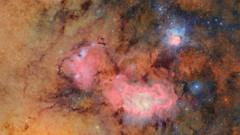Lovell's life journey began in 1928 when he developed a fascination for flying. His career with NASA started in the early 1960s, leading to notable missions like Apollo 8 and ultimately Apollo 13, which brought the world together during a time of uncertainty. Lovell's contributions to space exploration and his remarkable spirit continue to inspire generations, a legacy celebrated by his family and the space community.
Jim Lovell, the pioneering astronaut behind the successful Apollo 13 rescue, has died at 97, leaving behind a legacy in space exploration.
Jim Lovell, the celebrated astronaut who commandeered the ill-fated Apollo 13 mission back to Earth, has died at the age of 97. His death marks the end of an era for NASA, where he became an emblematic figure during a time of great uncertainty in space travel.
NASA paid tribute to Lovell, emphasizing his extraordinary ability to convert a potential disaster into a success story, as the crew fought to return safely from their ill-fated journey to the Moon. Lovell shared historical moments with fellow astronauts, broadcasting live images from space that resonated with tens of millions across the globe.
Born on March 25, 1928, Lovell's passion for aviation ignited his dreams of becoming a rocket scientist. Early on, he faced numerous hardships, including the passing of his father and financial struggles that forced him to turn to the Navy for higher education and flight training. His dedication eventually secured his place at NASA, where he was selected as part of the elite group tasked with achieving President Kennedy's goal of landing a man on the Moon.
Apollo 8, Lovell's first mission, was momentous, as it marked humanity's first journey around the Moon, garnering international attention and instilling a sense of unity. Lovell's call for a camera to capture the iconic "Earthrise" image solidified his role in historical space exploration.
In April 1970, Lovell faced perhaps his greatest test with Apollo 13 when an explosion occurred in the service module. The mission quickly turned from a lunar landing to a fight for survival. His calm leadership ensured the crew adapted and utilized the lunar module, Aquarius, to stay alive as they navigated back to Earth. The mission concluded with a triumphant splash down that was celebrated worldwide, demonstrating that even failure can pave the way for triumph.
Post-retirement, Lovell remained active in the public eye, sharing his experiences and continuing to inspire future generations. He authored a memoir that inspired the acclaimed film “Apollo 13,” showcasing his incredible journey in the space program. Though he has departed, Lovell's influence and legacy will continue to resonate through history and the future of space exploration.
Jim Lovell, the pioneering astronaut behind the successful Apollo 13 rescue, has died at 97, leaving behind a legacy in space exploration.
Jim Lovell, the celebrated astronaut who commandeered the ill-fated Apollo 13 mission back to Earth, has died at the age of 97. His death marks the end of an era for NASA, where he became an emblematic figure during a time of great uncertainty in space travel.
NASA paid tribute to Lovell, emphasizing his extraordinary ability to convert a potential disaster into a success story, as the crew fought to return safely from their ill-fated journey to the Moon. Lovell shared historical moments with fellow astronauts, broadcasting live images from space that resonated with tens of millions across the globe.
Born on March 25, 1928, Lovell's passion for aviation ignited his dreams of becoming a rocket scientist. Early on, he faced numerous hardships, including the passing of his father and financial struggles that forced him to turn to the Navy for higher education and flight training. His dedication eventually secured his place at NASA, where he was selected as part of the elite group tasked with achieving President Kennedy's goal of landing a man on the Moon.
Apollo 8, Lovell's first mission, was momentous, as it marked humanity's first journey around the Moon, garnering international attention and instilling a sense of unity. Lovell's call for a camera to capture the iconic "Earthrise" image solidified his role in historical space exploration.
In April 1970, Lovell faced perhaps his greatest test with Apollo 13 when an explosion occurred in the service module. The mission quickly turned from a lunar landing to a fight for survival. His calm leadership ensured the crew adapted and utilized the lunar module, Aquarius, to stay alive as they navigated back to Earth. The mission concluded with a triumphant splash down that was celebrated worldwide, demonstrating that even failure can pave the way for triumph.
Post-retirement, Lovell remained active in the public eye, sharing his experiences and continuing to inspire future generations. He authored a memoir that inspired the acclaimed film “Apollo 13,” showcasing his incredible journey in the space program. Though he has departed, Lovell's influence and legacy will continue to resonate through history and the future of space exploration.
















